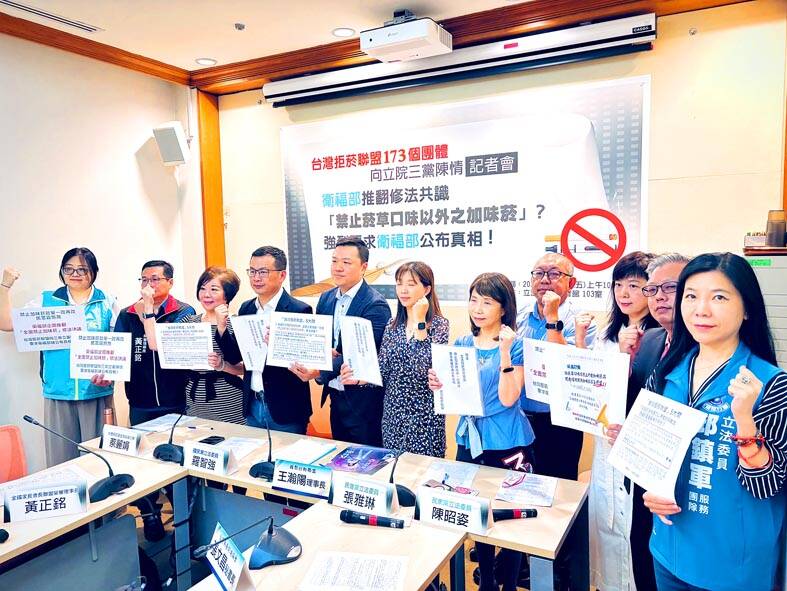A tobacco control alliance on Friday urged the Ministry of Health and Welfare not to impede proposed regulations to ban flavored cigarettes or postpone implementing the policy.
The alliance asked whether the ministry was opposing the legislative resolution to “ban flavored cigarettes outright” after it on Aug. 9 unveiled a preview of proposed regulations to ban 27 types of chemicals from being used in products such as cigarettes, vapes and heat-not-burn devices.
Additives used in flavored cigarettes encourage younger customers and women to smoke by reducing the sharp smell produced by cigarettes, Action Alliance on Basic Education chairman Wang Han-yang (王瀚陽) said.

Photo: Lin Hsin-han, Taipei Times
Article 10 of the Tobacco Hazards Prevention Act (菸害防制法) stipulates that additives prohibited by the central government should not be used in tobacco products, and legislators have agreed to ban all flavored cigarette products, he said.
The ministry in March last year proposed banning only four flavors — floral, fruit, chocolate and mint — which was challenged, as it did not cover the top 10 most frequently used flavors, Wang said.
However, after a delay of 16 months, the ministry proposed banning only 27 additives, instead of all flavored additives, saying that the move would be in line with US and EU practices, he said.
The alliance on Friday last week handed over a letter of petition signed by 173 civic groups to representatives of the ruling and opposition party caucuses.
“Does the ministry attempt to invalidate the legislative proposal to ban flavored cigarettes outright by prohibiting only 27 additives?” the letter asks.
“Can the ministry’s statement be substantiated when most regulations of the same kind in the US and the 27 EU nations are aimed at flavors of cigarettes, and the EU in particular has banned all flavored cigarettes that mask the taste and smell of tobacco?” it asks.
Saying that flavored cigarettes should be banned in line with President William Lai’s (賴清德) “Healthy Taiwan” plan, the group asked: “Why did the ministry prohibit only 27 additives, despite more than 1,200 different flavored additives having been reported by manufacturers in the industry?”
“Can the ministry also prohibit conceptual flavors invented by tobacco companies — ‘arctic air’ and ‘tropical breeze’ for example — solely by banning the additives?” it asked.
The Food and Drug Administration has personnel that inspect and impose fines for “abnormal smells or flavors of foods,” but the Health Promotion Administration says it cannot regulate cigarette flavors “simply by smelling,” the group said.
“Why does the ministry have such a disparate attitude toward tobacco companies?” it asked.

Alain Robert, known as the "French Spider-Man," praised Alex Honnold as exceptionally well-prepared after the US climber completed a free solo ascent of Taipei 101 yesterday. Robert said Honnold's ascent of the 508m-tall skyscraper in just more than one-and-a-half hours without using safety ropes or equipment was a remarkable achievement. "This is my life," he said in an interview conducted in French, adding that he liked the feeling of being "on the edge of danger." The 63-year-old Frenchman climbed Taipei 101 using ropes in December 2004, taking about four hours to reach the top. On a one-to-10 scale of difficulty, Robert said Taipei 101

Nipah virus infection is to be officially listed as a category 5 notifiable infectious disease in Taiwan in March, while clinical treatment guidelines are being formulated, the Centers for Disease Control (CDC) said yesterday. With Nipah infections being reported in other countries and considering its relatively high fatality rate, the centers on Jan. 16 announced that it would be listed as a notifiable infectious disease to bolster the nation’s systematic early warning system and increase public awareness, the CDC said. Bangladesh reported four fatal cases last year in separate districts, with three linked to raw date palm sap consumption, CDC Epidemic Intelligence

Taiwanese and US defense groups are collaborating to introduce deployable, semi-autonomous manufacturing systems for drones and components in a boost to the nation’s supply chain resilience. Taiwan’s G-Tech Optroelectronics Corp subsidiary GTOC and the US’ Aerkomm Inc on Friday announced an agreement with fellow US-based Firestorm Lab to adopt the latter’s xCell, a technology featuring 3D printers fitted in 6.1m container units. The systems enable aerial platforms and parts to be produced in high volumes from dispersed nodes capable of rapid redeployment, to minimize the risk of enemy strikes and to meet field requirements, they said. Firestorm chief technology officer Ian Muceus said

MORE FALL: An investigation into one of Xi’s key cronies, part of a broader ‘anti-corruption’ drive, indicates that he might have a deep distrust in the military, an expert said China’s latest military purge underscores systemic risks in its shift from collective leadership to sole rule under Chinese President Xi Jinping (習近平), and could disrupt its chain of command and military capabilities, a national security official said yesterday. If decisionmaking within the Chinese Communist Party has become “irrational” under one-man rule, the Taiwan Strait and the regional situation must be approached with extreme caution, given unforeseen risks, they added. The anonymous official made the remarks as China’s Central Military Commission Vice Chairman Zhang Youxia (張又俠) and Joint Staff Department Chief of Staff Liu Zhenli (劉振立) were reportedly being investigated for suspected “serious